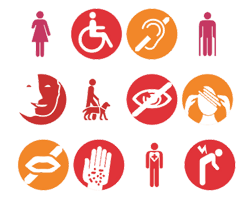Infos générales
- Durée de la formation
-
13 days
- Lieu(x) de la formation
- Université Toulouse Capitole
- Accessible en
-
- Formation continue
- Reprise d'étude
 Visitez le portail handicap sur le site de l'Université
Visitez le portail handicap sur le site de l'Université
This course focuses on the issues of sustainability and sustainable development from both a business (micro-level) as well as societal (macro-level) perspective. The overall aim of this programme is to enable practitioners to develop innovative and feasible solutions to resolve grand societal challenges and to make a difference in their organizations and the societies they are living in. As a part of the new Work-integrated Learning programme developed by the ENGAGE.EU university alliance, the course is developed and delivered in collaboration with Université Toulouse Capitole (FRA).
Université Toulouse Capitole
Bachelor’s/Licence's degree in economics, business, or law from a Norwegian/French or an accredited foreign educational institution, or significant professional experience in industry contexts facing sustainability and innovation challenges relevant to the programme.
The programme is targeted towards practitioners from contexts facing sustainability and innovation challenges, such as industry clusters, social entrepreneurs, managers in the private, public, and voluntary sectors, analysts, consultants, advisors, and board members.
The application process is the same whether you are applying for the full program or only for online modules.
The scope of the programme is equivalent to 7.5 ECTS at a master’s degree level. The overall duration of the programme is 8 full days. This includes 5 days of lectures (delivered online in synchronous and asynchronous teaching sessions) organized in 10 half-day sessions that are equally split between the two input modules on “Understanding Social Transition” and “Sustainable Business Modules”. The input-oriented phase is complemented by 3 full days of an application-oriented workshop taking place as an in-person event in Toulouse. Possibility to follow modules 1 and 2 independently.
To achieve these goals, the programme is structured in three modules of equal weighting. The first two input modules provide participants with the relevant insights, knowledge, and skills for addressing and tackling grand societal challenges from both a macro-level (“Understanding Societal Transition”, delivered by Université Toulouse Capitole) as well as a micro-level (“Sustainable Business Models”, delivered by NHH Norwegian School of Economics) of perspective. The third application-oriented module is an intensive workshop taking place in Toulouse. In this module (“The Bootcamp”) participants work in international and interdisciplinary teams to apply their learnings from the input modules to develop a feasible solution for a real-life societal challenge sponsored by Engage.EU stakeholders.
The programme consists of three modules: two input-oriented modules of 2.5 days each delivered online (combining synchronous and asynchronous lectures and groupwork sessions), followed by one application-oriented module of three days taking place as in-person workshop in Toulouse (FRA). Possibility to follow modules 1 and 2 independently. The contents and organization of the three modules are described below.
The first module of the course takes a macro-level perspective to explore nature, forms and implications of societal transition. Faced with climate constraints and environmental challenges, companies, like all other actors, must change profoundly and engage in this transition. However, understanding this societal transition requires thinking about the relationships and interdependencies between different scientific phenomena and disciplines. We propose to do this through the systemic approach complemented by theories of complexity by considering the transition as a complex system. This transition means that the transformations required, in particular through adaptation and fight against climate change, will impact all of our ways of producing and consuming but also of deciding and, more generally, of living. We propose to examine them and show their relationships. One of these dimensions of societal transition is the "relationship to the world" (H. Rosa) that postmodernity individuals maintain. Therefore, the question of "resonance" arises in the context of the transition. Finally, we will conclude with the way in which the societal transition questions the entrepreneurial project in order to conclude on sustainable business models.
Faced with the urgency of climate threats (IPCC reports) and the extent of the degradation of the biosphere (biodiversity, pollution, etc.), it is a question of designating, describing and correctly understanding an unprecedented situation. During this session, we will see that the concept of transition (and resilience) which is more systemic, replace those of sustainable development and sustainability. At the end of the session, participants will be able to define societal transition.
Designing societal transition requires thinking about the relationships and interdependencies between phenomena and between different scientific disciplines. Climate and environmental threats induce systemic risks to human societies, and addressing them requires policies that are themselves systemic. In addition to this systemic dimension, we must add the complexity resulting in particular from the probable non-linearity of the process and therefore its high unpredictability. At the end of the session, participants will be able to represent the societal transition as a complex system.
If technical change and innovation carry a lot of hope in the contemporary situation, the thought of technology leads to relativize this optimism. Indeed, the societal transition requires major changes in behaviour in most areas of human activity and involves large-scale transformations in the way we produce, consume and live together. It will be a question of identifying them and putting them in relation to grasp their interdependencies. At the end of the session, participants will have this global vision in order to better define the positioning of their own activity.
According to sociologist Harmut Rosa, individuals in "late postmodernity" societies, characterized by a "great acceleration", are experiencing a crisis of their "relationship to the world" that he develops with the concept of "resonance". We will see that one of the conditions for the success of the societal transition is the transformation of the "relationship to the world" of contemporary individuals. At the end of the session, participants will be able to understand that the societal transition implies finding "resonant" relationships with the world.
Like all actors, societal transition profoundly affects private companies both in their purposes and in their operation. During this session, we will examine some dimensions of this questioning to conclude on the theme of sustainable business models treated in the next module. Participants will thus be able to position sustainable business models in the context of the changes induced on private companies by the societal transition.
The second module of the course takes a micro-level perspective to explore how private-sector businesses can tackle grand societal challenges by enacting sustainable business models. Sustainable business models integrate economic with social and ecological value creation and are an important catalyst for system-wide societal transition towards a more sustainable future. This module introduces the concepts of business models and business model innovation as both powerful cognitive frames and practical management tools for either re-inventing existing business models to align them with today’s grand societal challenges or designing new business models that tackle some specific societal grand challenge. To showcase the applicability and practical relevance of these techniques, we will use the aviation and aluminium metal industry as two resource-intensive industrial contexts that matter to people and society whilst facing major sustainability and innovation challenges to which they are urged to find adequate responses.
This second module is organized in 5 half-day sessions with the following contents :
In order to either re-invent existing business models to align them with today’s grand societal challenges or design new business models that tackle some specific societal grand challenge, one must first understand the concept of business models and learn to analyse them. In this first session, we will introduce the participants to the basic concepts, frameworks, and theories on business models. By the end of this session, participants are able to identify, describe, and analyse existing business models to find out about their strengths and weaknesses and the necessity as well as potential to change them in ways to address and tackle societal challenges.
Sustainable business models integrate the creation of economic, environmental, and social value. A sustainable business model differs from a conventional business model in that it creates, delivers, and captures value for all stakeholders without depleting the natural, economic, and social capital it relies on. In this session, we will introduce the participants to different types of sustainable business models and develop criteria to choose the one that may fit best with a company’s mission. We will furthermore discuss trends that are disrupting different industries (e.g., the sharing economy, disruptive innovation, digitalization) and explore how these trends require, or have enabled, new sustainable business models to emerge, such as circular business models, hybrid organizations, or collaborative business models. By the end of this session, participants have acquired a comprehensive overview of the different types of sustainable business models and can identify which of these business models may be best suited for a company, or industry.
In established firms, sustainable business model innovation refers to the process of either (1) introducing a sustainable business model to the firm’s existing business model portfolio (by diversification), or (2) innovating the firm’s core business model to increase its positive (or reduce its negative) impact on society and/ or environment. In this session, we will discuss the various challenges when attempting to design sustainable business models. We will furthermore explore possible solutions to these challenges. By the end of this session, participants …
Innovation is central to either types of sustainable business model innovation, whether the focus is on modifying an existing business model to make it sustainable or designing a new business model to address and tackle a specific societal challenge. In this session, we will introduce the participants to the fundamental aspects of entrepreneurship as a process with innovations as its outcome. We will learn the relevant criteria to distinguish different types of innovations and explore the question of how “new-to-the-world” successful innovations should (not) be. Furthermore, we will discuss models describing certain trajectories that innovations typically follow in terms of (technological) performance and diffusion. By the end of the session, participants will understand the principles of innovation, the difference between inventions and innovations, as well as the key features of different types of innovations and their diffusion patterns.
Spurred by increasing use of digital technologies and platforms, sustainable business models and their underlying innovations are increasingly prone to produce certain demand side externalities that determine their diffusion potential. In this session, we will focus on network externalities as powerful driver of innovation diffusion and key factor determining the successful scaling of the business model innovations within and across country borders. We will explore different types of network effects, their antecedents, and their consequences for companies, industries, and societies. By the end of the session, participants will understand the link between specific features of innovations and the strength of the network effects they may produce, including the role of national country borders as potential impediments to leveraging sustainable business model innovations prone to network effects internationally.
The bootcamp is a 3 full day intensive learning experience where course participants will apply the insights, knowledge, and skills gained in the two previous input-oriented modules to a real-life societal challenge sponsored by an Engage.EU stakeholder.
The participants will have the opportunity to put in practice and employ what they have learned about sustainable business models and managing societal transition during the previous two input-oriented modules of the programme. As an application-oriented workshop, the bootcamp will be take place as an in-person event in Toulouse, hosted by one of the ENGAGE.EU Labs maintained by the Université of Toulouse Capitole 1. In theses labs, participants will work collaboratively in international teams assisted by experiences staff and lab coordinators. In this way, the bootcamp provides groups of participants an opportunity to make a difference by taking on real-life challenges and developing solutions that will have a direct impact. In addition to the contents- and methods-related knowledge and skills acquired during the first two modules, participants will gain further skills such as solution-oriented thinking and international and cross-sectoral collaboration and communication skills. Furthermore, the bootcamp offers opportunities to grow participants’ international networks, to exchange experiences, and to make new connections around professional topics.
The programme will be taught in a combination of online (synchronous and asynchronous) lectures, group work and presentation sessions; the bootcamp will take place as an in-person intensive workshop in Toulouse, guided by experienced lab coordinators form the local ENGAGE.EU Lab. In addition to the academic lecturers, external speakers will be included to contribute practical insights and first-hand experiences in guest lectures. The number of participants will be limited to 24.
Take an exam to earn 7.5 ECTS. Participants who aim to use the course as one module within a degree-giving program (e.g., MBA) are advised to take the exam.
Assessment on a Pass/Fail basis depending on their regular attendance and participation in the three modules.
Participants who take part in and pass the final examination receive a university diploma from the Université Toulouse Capitole for 7.5 ECTS.
Participants who chose to not take final examination but have passed the course (only online modules) receive a certificate of their successful participation in the programme.
After completing the programme, participants will have acquired the following learning outcomes, defined in terms of knowledge, skills, and competences.
The participants will have :

